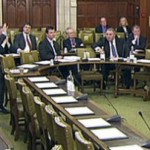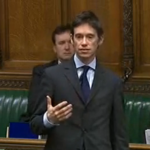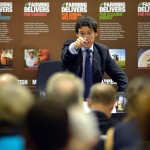Published by The London Review of Books, 18th March 2011
Until yesterday, I thought we were at the end of the age of intervention. The complacency that followed the collapse of the Soviet Union had been shattered by the Balkan wars; despair was followed by the successful interventions in Bosnia and then Kosovo; then triumphal pride led us to disaster in Iraq and Afghanistan. Midway through the period, in 2000, it seemed we could intervene anywhere. By 2010, it felt as though we would not venture abroad again. What had begun with the irresistible victory of democracy, the free market and the United States, ended with occupation, financial crisis and American impotence.
It seemed doubly unlikely that we would ever intervene in a country like Libya. Even oil-less, Central Asian Afghanistan was perceived by many Muslims as the object of a crusading infidel occupation, driven by Israel and designed to establish bases or extract cheaper oil. Any move against Libya – an Arab, Muslim country, obsessed with its struggle against colonialism and dripping with oil – seemed bound to be perceived in the most hostile and sinister terms by its neighbours, by the developing world and by the Libyans themselves.
Nor did Libya appear to meet the criteria for intervention under international law. Gaddafi was the sovereign power, not the rebels, and he was not conducting genocide or ethnic cleansing. In Bosnia, by contrast, 100,000 people had died in a few weeks; and it was Bosnia itself – a sovereign, UN-recognised state – which formally requested the intervention. Kosovo was a less clear case, but the intervention targeted Milosevic, and followed the Balkan wars, which he had stoked, and the displacement of 200,000 people and clear evidence of ethnically-targeted atrocities. This interventionist worldview, which might have seemed in 1999 the quintessence of global governance and consensus, had, however, begun to seem a fading Western obsession. By 2011 Brazil, India and South Africa, as well as China, were on the Security Council. And none of them supported intervention.
So I argued on Thursday in the House of Commons that while we had a moral right to protect Libyans from Gaddafi, it would be wrong to act without a full UN Security Council resolution. Britain should use its support of the no-fly zone to give a clear signal of its opposition to Gaddafi and its support for progress in the Middle East. At the time it seemed that a Russian veto would ensure that this would not actually be backed by fighter jets.
But Russia didn’t veto the resolution. And, as of last night, 17 March, the French, British and Americans are cleared to intervene in the Middle East ‘with all necessary measures’. The planes are moving into position. The foreign ministers of minor Arab states are taking calls on their cell-phones from Western politicians. Twitter accounts explode around the Libyan hash-tag. And I imagine that in small executive offices, lit by giant television screens, generals, special advisers, diplomats, press handlers and politicians are trying to work out what to do.
Gaddafi’s initial response has been nimble. Within half an hour of the resolution his spokesman was parroting UN English: ‘the technical aspects of the ceasefire’, ‘some concerns over the text’. He used a translator to turn his English back into Arabic – perhaps his audience was in the Gulf and he wanted to use only the most formal Arabic. But the translator, who was more confident with standard authoritarian phrases about ‘the peaceful intention of the Libyan national security forces’, struggled with the UN jargon and had to be corrected by his boss. On Friday morning, the Libyan foreign minister found his stride and his new persona as a constructive and neutral participant. He spoke in Arabic, talking so deferentially of the ‘Majlis al-Aman’ (‘the Security Assembly’) that it took me a moment to realise he was referring to the UN Security Council, not to some security apparatus of Gaddafi’s.
How about our response? If the crises of Bosnia, Kosovo, Iraq and Afghanistan, which have consumed more than 100,000 lives, four trillion dollars and absorbed a million foreign soldiers from 60 countries, have not made us more prudent, they should at least have made us wiser. For two decades our policies in these countries have been described, explained and criticised by political philosophers, civil servants, human rights activists, journalists, development workers, film-makers and 10,000 consultants. Parliamentarians round the world refer confidently to ‘Chapter 7 resolutions’, ‘no-fly zones’, ‘the experience of the Kurds’ and ‘the responsibility to protect’. But the basic questions about intervention seem to remain as obvious as they are unhelpful. You do not need to be able to name four cities in Libya to have four arguments against or for what we are doing. You can simply deploy those which were used in 1960s Vietnam, 1920s Syria and 1860s Afghanistan.
The arguments against intervention are neatly itemised by Albert Hirschman as ‘perversity’, ‘futility’ and ‘jeopardy’: an intervention could be dangerous (for us or for Libya); it could achieve nothing; or it could achieve exactly the reverse of what it intended. This line can be bolstered by the language of medicine or commerce: ‘first do no harm’; ‘it’s none of our business’; ‘we’re broke’. Or even race. Thus Conor Cruise O’Brien in 1992: ‘There are places where a lot of men prefer war, and the looting and raping and domineering that go with it, to any sort of peacetime occupation. One such place is Afghanistan. Another is Yugoslavia after the collapse of the centralising Communist regime.’
Against these stand the four national security arguments for intervention: fear of a rogue state, fear of a failed state, fear for the neighbours and fear for ourselves. First, we called Iraq a rogue state – the weapons of mass destruction, which could be launched within 45 minutes. Second, we called Afghanistan in 2002 a failed state – the vacuum filled by drug-dealers and terrorists. Third, in 2009, we emphasised the fear for Afghanistan’s neighbour Pakistan: ‘If Afghanistan falls, Pakistan will fall and mad mullahs will get their hands on nuclear weapons in Pakistan.’ (In Vietnam, this was called ‘the domino theory’.) Fourth, we are fearful for our reputation. From Kissinger in Vietnam to the British in Afghanistan there is the eternal anxiety about being seen to be defeated, of giving confidence to enemies, of losing credibility. In Libya’s case, these arguments focus on fear of Gaddafi; fear of al-Qaida in a post-Gaddafi failed state; fear of instability in the region (civil war in Libya shaking North Africa and pushing refugees across the Mediterranean into Europe); and fear for our own credibility (what if he survives our threats and imprecations?).
Then there are the moral arguments. There are the arguments against from international law (‘it is in contravention of state sovereignty’) and arguments from guilt (‘we are the people who armed and supported Gaddafi in the first place’). There are the arguments in favour based on the scale – brought home in continual news footage – of human suffering, which make the point that inaction is leading to more deaths: that we have a right and a duty to prevent the killing, a moral obligation to the Libyan people.
Thus, three arguments against action. Four fears about inaction. And a background of guilt, law and moral obligation. Each position has its own historical analogy. If you oppose intervention, you call it ‘another Vietnam’. If you support intervention on national security grounds, you call the opponents appeasers and invoke Munich. And you could still do a ‘replace all’ and instead of Libya insert Zimbabwe, Darfur or for that matter Abyssinia, the Hejaz or ‘the Kingdom of Caubul and its dependencies’. Here more than ever what seems to matter is not detailed knowledge of the country concerned but a basic attitude of mind: a high optimism, a reactionary pessimism and very rarely anything in between.
This is not to say that the millions of pages produced over the last two decades have achieved nothing. The arguments have been given a makeover and presented in a more contemporary design, encrusted with sparkling statistics, buttressed with new analogies. If you want, you can now replace Vietnam with Iraq, Munich with Rwanda and the Second World War with Bosnia. The ‘forward policy’ is now called ‘state-building’ and ‘pacification’ is ‘counter-insurgency’.
But the basic positions remain black and white. Do it or don’t do it, but no halfway houses. And therein lies the danger. On the World Service this afternoon, I was accused of falling between two stools. ‘On the one hand, you say the no-fly zone is humanitarian and not about regime change. On the other hand, you say that we are taking measures against the Gaddafi regime to force him to step down.’ And when I tried to make a distinction between military measures with a humanitarian purpose and civilian measures with a political purpose, the interviewer countered: ‘Surely this is the worst of all worlds.’ On the contrary, it seems to me the lesser evil. The no-fly zone is preferable to seeming to countenance and endorse Gaddafi’s actions; and better than putting troops on the ground to force regime change. But such measures are difficult to explain and sell.
Perhaps I am simply traumatised by the failure to stop more troop deployments to Afghanistan. Perhaps this time I should welcome the decision rather than offer grudging support and grim cautions. After all, the UN resolution is clearly opposed to occupation. The West is bruised, feels impoverished and its military is overstretched. Its new leaders have so far proved able to circumvent or answer the irrepressible optimism and bleak warnings of the hawks in their administrations. Obama has successfully fought off the pressure to send any more troops to Afghanistan and Cameron has set an unconditional deadline of 2015 for the end of combat operations there. Both have relied on relatively cautious language. It can, therefore, seem improbable that we would allow ourselves to be dragged deeper.
And yet, I cannot get beyond my experience of the way in Afghanistan we seemed to be dragged unstoppably deeper. There, the best arguments against further intervention rely on a level of specificity and detail about the country which is rarely appealing to policy-makers, and rarely seems relevant to their debates. (Try making an argument against the efficacy of sanctions based on a detailed reading of Gaddafi’s regime, its ideology and its attitude to the West.)
By contrast the rhetoric and the logic in favour of doing more felt hypnotising and irrepressible. Yet the arguments used in Afghanistan are already being applied to Libya. All those concerns about Gaddafi and stability can be quickly translated into the ‘existential threat to global security’ and into those four fears, which lead to talk of failure not being an option. They mean that, as an American general recently told me in Afghanistan, ‘Plan B is more of Plan A.’ When we speak of having an obligation (in this case a moral obligation towards the Libyan people) or a ‘duty to intervene’ we tend to imagine it as an almost unconditional obligation. The complex logic, statistics and theories which drove the surge in Afghanistan remain immensely appealing. The same people will soon be working on Libya. And if they find that the no-fly zone is not having the effect they wanted: not toppling the regime, not eliminating human rights abuses, not fostering international security, they will press for more.
We need therefore to work out how best to use the no-fly zone, while recognising how insecure and reckless we can be tempted to be. I had imagined the time had come to remind people that, despite Afghanistan, we can still play a constructive international role. But today, though I am in favour of the no-fly zone, it seems as though the real danger remains not despair but our irrepressible, almost hyperactive actions: that sense of moral obligation; those fears about rogue states, failed states, regions and our own credibility, which threaten to make this decade again a decade of over-intervention.


















